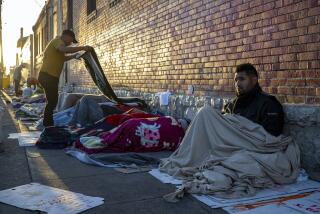This California congressman wants Cuba to send back the man who hijacked his plane 44 years ago
- Share via
Reporting from Washington — As U.S. diplomatic relations with Cuba normalize, a California congressman wants to know what the federal government is doing to bring back the man who kidnapped him and a plane full of people in November 1971.
Rep. Jerry McNerney is hoping the matter will come up when President Obama visits Cuba later this month.
“I don’t think it should be a focus,” the Stockton Democrat said. But “we can’t forget that there are criminals there that need to be extradited.”
McNerney was 21 when three men wanted for the shooting death of a New Mexico state police officer ran up the gangway of TWA Flight 106 as it left the state for Chicago with 150 passengers. Two of the men, Ralph Lawrence and Albert Finney, have since died, but the third, Charles Hill, is thought to still live in Cuba.
McNerney had recently dropped out of the U.S. Military Academy at West Point, and his father had bought the future congressman a ticket to the Army-Navy football game in Chicago in hopes the contest would entice him to go back.
At the time, a spate of aircraft hijackings in the United States and internationally had earned headlines.
When McNerney’s parents dropped him off at the airport in Albuquerque for the evening flight, “my mom said, ‘Don’t get hijacked!’ Like it was a big joke because these hijackings were going on at that time,” he said in an interview in his Capitol Hill office.
Soon after, Hill, Lawrence and Finney drove onto the tarmac in a stolen truck and straight to the stairs leading up to the plane. The men, wanted in the death of Robert Rosenbloom, the state police officer, were the subjects of a manhunt and had been in the news for weeks.
“They had their guns, so we were pretty much at their mercy. It wasn’t too frightening necessarily, but it’s not always a good feeling to have someone in control of you,” McNerney said.
The armed men sat in first class, smoking, drinking Michelob beer, McNerney said. They kept passengers in their seats, but one of the men searched him for a weapon before allowing him to use the restroom, he said.
The men initially wanted to fly to Africa but then decided on Cuba when the pilots told them the plane didn’t have enough fuel for a transcontinental trip, McNerney said.
They agreed to drop the passengers off in Tampa, Fla., where McNerney said police and rescue personnel lined the runway.
“It was a little scary when we landed because the week before a plane had been hijacked and everyone was killed,” he said. The passengers were hoping, “I hope no one is trigger-happy out there,” he said.
The passengers were let off the plane in Florida without incident. Hill, Lawrence and Finney then headed to Cuba and were welcomed by the nation’s officials as fugitives. Hill was put to work cutting sugar cane and managing a clothing store. He married twice and raised children in Cuba.
U.S. officials say Lawrence died in 1973, and Finney in 2005.
Over the years, Hill and the hijacking occasionally come to mind, McNerney said.
“Every so often you say, ‘You know, those guys killed a trooper, they put all of our lives at risk because they made a huge, bad decision and then they walked away.’ It’s not something that feels good,” McNerney said.
In December 2014, Obama announced that the United States would resume normal diplomatic relations with the island nation located off the Florida coast. The move opened doors for tourism, trade and even mail service. Each nation has reopened embassies in the other’s capital for the first time since the 1960s.
Obama is scheduled to visit Cuba in late March, a major shift in policy that has attracted global interest.
McNerney said he is excited about the president’s trip and wants the United States to have a normal relationship with the communist country, “but as part of a normal relationship, you don’t let hijackers come to your country and walk around scot-free. That has to be part of negotiations.”
Starting with a July 24 letter to the State Department, McNerney has repeatedly urged Secretary of State John Kerry to push Cuba to extradite Hill and other U.S. fugitives living there.
U.S. and Cuban officials met in early November to discuss law enforcement issues including terrorism, narcotics and fugitives, with discussions to continue in mid-2016. Kerry recently canceled a visit to Cuba after disagreements over which political dissidents he could meet with while there.
A State Department spokesman said the United States continues to push Cuba on returning fugitives whenever it can.
McNerney said he hasn’t heard from the State Department in months.
“I imagine that they need to be reminded,” he said.
New Mexico Gov. Susana Martinez and the members of the state’s congressional delegation have been asking the State Department and Justice Department to bring Hill back to stand trial in Rosenbloom’s death.
“The charges are active, remain pending and will be pursued by both federal and state authorities if he is extradited to New Mexico,” said Martinez spokesman Michael Lonergan.
Last April, Hill, then 65, told CNN that he wanted to come back to the United States to eat at a McDonald’s and see his family, including the daughter he left behind.
After Obama announced his trip to Cuba, several members of Congress from New Jersey said the president shouldn’t go until the Castro government returns Joanne Chesimard, an American prison escapee convicted of killing a police officer. In 2013, the FBI placed Chesimard on its list of most wanted terrorists.
So far, one American fugitive has been returned. Last December, the U.S. Marshals Service retrieved Shawn Wegmann, who was wanted in Iowa on firearms charges and had fled to Cuba earlier in the year in a stolen 13-foot boat.
No government agency tracks how many Americans have fled to Cuba to avoid punishment, and few extradition requests were made before Obama’s move to normalize relations, according to a 2015 investigation by the South Florida Sun-Sentinel.
McNerney said he’ll wait and see what Obama does in two weeks when he becomes the first sitting president to visit the island nation in 80 years.
“They should send back the folks that are our criminals and not let them be scot-free,” McNerney said. “I can’t imagine that it’s good for a country to have criminals from America running around their streets, it just doesn’t make sense.”
Follow @sarahdwire on Twitter
Read more about the 55 members of California’s delegation at latimes.com/politics
ALSO
Why a congresswoman from Los Angeles is talking about Africa
Why this congressman will be riding the lightrail instead of going to Super Bowl 50
‘We walk with Hillary’: Why an L.A. congressman tells voters -- in 2 languages -- to caucus
More to Read
Get the L.A. Times Politics newsletter
Deeply reported insights into legislation, politics and policy from Sacramento, Washington and beyond. In your inbox twice per week.
You may occasionally receive promotional content from the Los Angeles Times.











